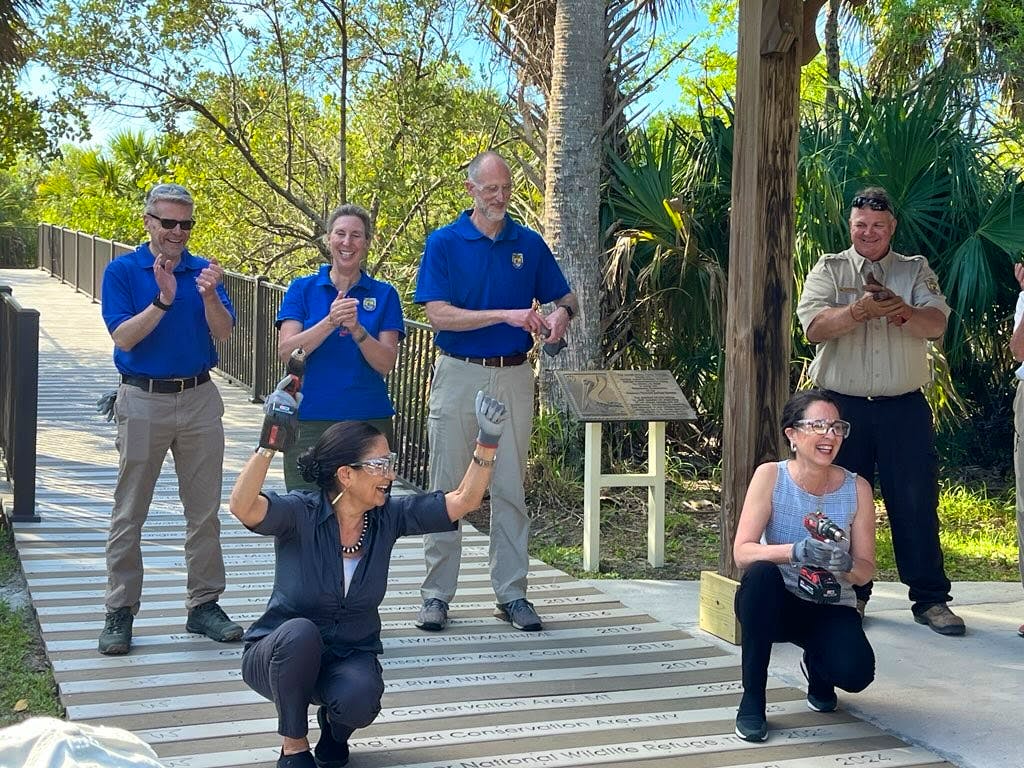Tweet“After years of effort to protect this ecoregion, we are thrilled by this expansion to the Florida Wildlife Corridor. Well-known species like the Florida manatee and panther, as well as lesser-known species like the Florida bonneted bat, crested caracara, eastern indigo snake and others will now stand a chance at a secure future. Protecting areas from development will also benefit important watersheds including Fisheating Creek, Myakka River, Peace River and others, which will improve water quality throughout and enhance Everglades restoration.”
Defenders of Wildlife joined today with conservation groups and the U.S. Fish and Wildlife Service to celebrate the official designation of the Everglades to Gulf Conservation Area, the newest addition to the National Wildlife Refuge System.
Led by the FWS and coordinated in large part with private landowners, the area will conserve lands and waters across four million acres of largely intact rural and ranching landscape, using patches of purchased land and land obtained by easement. The conservation area’s creation is a tremendous win for the over 100 threatened and endangered species that call it home, including the world’s only breeding population of the endangered Florida panther.
“The establishment of the Everglades to Gulf Conservation Area as part of the National Wildlife Refuge System is a bold step forward for conservation,” said Ben Prater, Southeast program director for Defenders of Wildlife. “Securing habitat for dozens of imperiled species while preserving rural and working lands is a victory for protecting the wild character and natural legacy of Southwest Florida. Defenders of Wildlife is proud to see this vision become a reality.”
The Everglades to Gulf Conservation Area has the potential to conserve crucial species and habitats threatened by rapid human development — which is increasingly causing habitat fragmentation and mortality from vehicular collisions — and the effects of climate change. The conservation area spans a landscape of great biological diversity, using interconnected lands and waters between Florida Panther National Wildlife Refuge and Everglades Headwaters National Wildlife Refuge and Conservation Area.
“After years of effort to protect this ecoregion, we are thrilled by this expansion to the Florida Wildlife Corridor. Well-known species like the Florida manatee and panther, as well as lesser-known species like the Florida bonneted bat, crested caracara, eastern indigo snake and others will now stand a chance at a secure future,” said Elizabeth Fleming, senior Florida representative for Defenders of Wildlife. “Protecting areas from development will also benefit important watersheds including Fisheating Creek, Myakka River, Peace River and others, which will improve water quality throughout and enhance Everglades restoration.”
“The U.S. Fish and Wildlife Service Everglades to Gulf Conservation Area is the result of decades of work by multiple state and federal agencies and the larger conservation community,” said Julie Morris, executive director of the Florida Conservation Group, whose ecological expertise helped inform FWS’ vision for the conservation area. “This region stands out due to its tremendous biological diversity and the partnerships among agencies, NGOs, landowners, sportsmen and others who have come together to make this happen. FCG is especially grateful to Defenders of Wildlife for their tireless work and support of our outreach efforts.”
The Everglades to Gulf Conservation Area was the subject of a draft Land Protection Plan and Environmental Assessment released in 2023, followed by a 30-day public comment period. Comments submitted by other agencies, Tribes, landowners, conservation groups and sportsmen and women, as well as other partners and the general public, were overwhelmingly supportive of establishing the conservation area.
For over 75 years, Defenders of Wildlife has remained dedicated to protecting all native animals and plants in their natural communities. With a nationwide network of nearly 2.1 million members and supporters, Defenders of Wildlife is a leading advocate for innovative solutions to safeguard our wildlife for generations to come. To learn more, please visit https://defenders.org/newsroom or follow us on X @Defenders.
News

Defenders Calls on Service to Pull Out from Habitat-Degrading Land Swap








